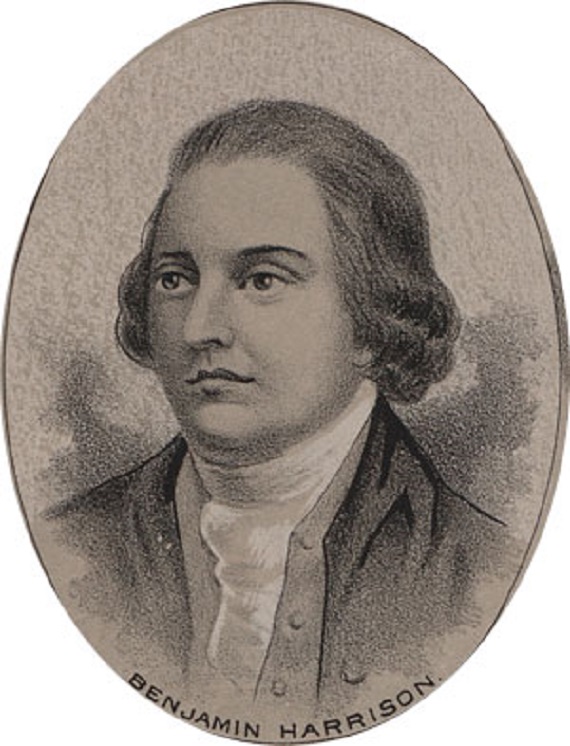Benjamin Harrison the Signer was born at Berkely (later called Harrison’s Landing) in Charles City County, Virginia. He was the son of Benjamin Harrison and Anne Carter Harrison, daughter of Robert ‘King’ Carter of Corotoman. After education at the College of William and Mary this Benjamin in 1749 became the fifth in a line of planter/politicians of the same name to sit in and stolen slaves were returned or replaced. And when an excise was proposed in place of the Impost he fought against it as a Yankee plot, and brought to bear upon the struggle all of his resources.
In 1774 Benjamin Harrison owned (without problems of conscience) eight plantations and hundreds of slaves. His commercial interests involved both importation and shipping, both up and down the coast and across the ocean. All of this plenty he gladly put at risk to preserve in Virginia the regime his family had done so much to create. Indeed he accepted the looting of his great house at Berkeley by British troops as part of the fortunes of war and was generous of his own means in providing supply to Washington’s army. But in the fashioning of a larger patria to contain and modify his identity with Virginia, Harrison was much less venturesome. With Patrick Henry, he defended the conduct of the Virginia legislature in the attainder of the barbarous outlaw, Josiah Philips, and denied the advantage of a security for individual civil rights under the provisions of Federal law. When a criminal placed himself outside the protection of their laws, Virginians would decide his fate. And it would be Virginians who decided who belonged to their community and what protections went with such membership. Josiah Philips had clearly (in the old phrase) “needed killing.” So reasoned Benjamin Harrison. In the ratification convention in Richmond Harrison was astonished that Edmund Randolph would argue for intrusion of the national authorities into such questions of local police and felt that such intrusion could not be restrained—once it had begun.
Benjamin Harrison served in the Virginia ratification convention as chairman of a committee on privileges and elections. His early commitment to the Antifederalist cause surprised few public figures in his state, but it did lend respectability to his side of the debate. Any attempt by the Virginia Federalists to invoke the politics of deference was doomed from the beginning with such men of family as John Tyler, Richard Henry Lee, George Mason, Theodorick Bland and former governor Harrison opposed to ratification. Harrison spoke only twice during the Virginia debates: first on the attainder of Philips and then, on June 25th, the last day of the convention, in a general address on his basic objections to the document under consideration. In these summary remarks Harrison rejected the scare tactics of the Federalist orators when they declaimed that the Union itself would be in danger if the Constitution were not approved. “A vast majority, from every calculation, are attached to it.” But union was one thing and a powerful central government another. To convert the state into an engine for sectional aggrandizement would be harmful to the national unity fostered among the people of the states by the Revolution. He doubted that there was any protection for the South in a stronger connection with New England. “When we were invaded, did any gentleman from the Northern States come to relieve us? No, sir, we were left to be buffeted. General Washington, in the greatness of his soul, came with the French auxiliaries and relieved us opportunely. Were it not for this, we should have been ruined.” Harrison was prepared to accept a revision of the national compact, with previous amendments. Otherwise, “I should resist with the fortitude of a man.”
For the master of Berkeley the triumph of the Federalists in the Virginia ratification convention was a disappointment but not a disaster. He was puzzled by their centralizing disposition, but not outraged, having had an earlier nationalists phase himself. Harrison was a member of the committee appointed to “prepare and report” subsequent amendments. He discouraged the publication of a sour Antifederalist minority report such as had been produced in other states. Resolving against resistance and for a fair test of the new form of government, he joined Henry, after ratification, in preserving Antifederalist control of the Virginia House of Delegates and helped pass the Bill of Rights through the chamber, once presented there by the Congress of the United States.
Benjamin Harrison, in his prudence, caution and length of service to the state which commanded his primary loyalty, in his untroubled affirmation of the values of his fathers and the culture which they had brought to its maturity, was a symbol of continuity with Virginia’s “Golden Age” as the Old Dominion entered upon its great experiment with political life inside the Federal Union, a massive figure in high black boots and elegant blue coat, with full white locks tied in queue. No public man of his time kept better society, or was more often consulted in the business of his state. Yet his own favorite companions were his sons–and his special counsellors, a large cat and a small dog who, before their master, played well together and kept the peace.
At the age of 65, Benjamin Harrison ended where he began and died at Berkeley-a man sometimes alarmed by the upheavals of his time, but never driven beyond the boundaries of his composure by what occurred.







